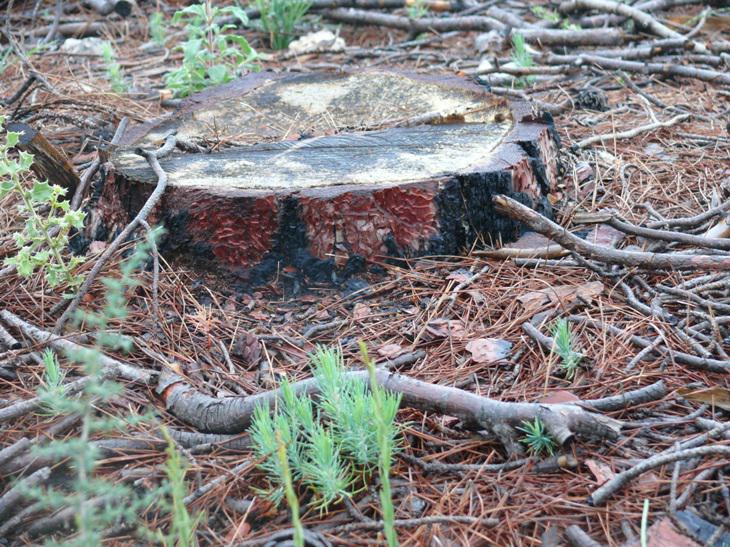Cagatay Tavsanoglu
The main aim of the study is to allow better conservation of Mediterranean forests by determining fire ephemeral species, if any, in the Mediterranean Basin first time.

Pine seedlings next to a burned trunk.
Fire is a significant ecological factor shaping plant species and vegetation in Mediterranean ecosystems. Many plant species have adapted to fire regimes in these ecosystems, resulting in the evolution of fire-adapted traits. These traits allow plant populations to persist after fires. Many species in Mediterranean ecosystems have dormant seeds which remain ungerminated for many years in the soil seed bank. These seeds germinate massively after fires due to breaking their dormancy by high temperatures appeared and chemicals released during a fire.
In Mediterranean ecosystems of California, South Africa and Western Australia, there are many records of fire ephemerals, the plant species in which germination is only restricted to post-fire environments. These species appear just after the fire and then disappear from vegetation, but their seeds are found in the soil seed bank alive for many years until the next fire occurs. Although the importance of heat shock and smoke as germination cue has been realized in the Mediterranean Basin in recent years, no evidence has been found regarding the fire ephemerals in this region. This may lead to underestimation of the conservation of post-fire habitats.
In Turkey, burned woodland and shrubland areas did not receive any protection from human activities such as grazing, and many burned areas are disturbed by forestry service for artificial afforestation. It is possible that natural populations of fire ephemerals, if any exists, may be negatively affected from such human-related activities. Any information on the presence of fire ephemerals in the Mediterranean Basin would have changed the authorities view upon the burned forest or shrubland areas. Therefore, my work will help to develop governmental and scientific awareness on natural regeneration of burned areas and will contribute to the conservation of post-fire habitats.
The study will be conducted in Mugla Province, southwestern Anatolia, Turkey. We will select three recently burned (by 2013 summer) Pinus brutia forest sites and adjacent three unburned sites to study. In each study site, field studies will be performed to determine the plant species appear after fire. Moreover, in the laboratory, seed germination experiments will be performed to detect if the species appeared after fire have enhanced post-fire germination. The presence or absence of enhanced germination after fire-related cues (heat shock and smoke) will be matched with the field data to determine the fire ephemeral species.
At the end of the project, a workshop will be held in Mugla, to disseminate the conservation outputs of the project, especially for forest managers, local authorities and students from biology and forestry departments.